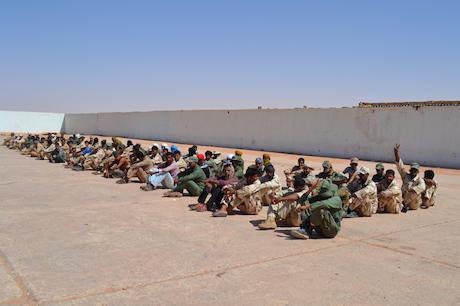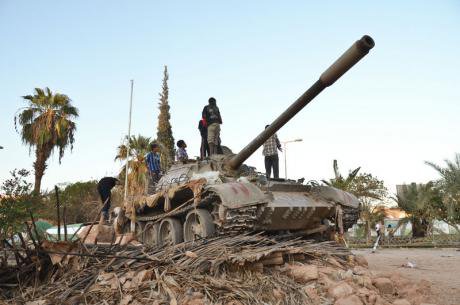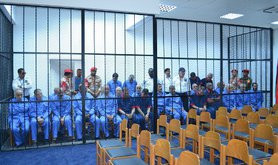
The Touareg Salafi Katiba 315 camp in Fezzan. Demotix/Maryline Dumas. All rights reserved.Four years since the fall and assassination of Qaddafi, Libya remains in a state of chaos, threatening the territorial unity of the country and its population. This alarming situation is also on the verge of creating transnational chaos right across north Africa and the Sahel, as its overspill has already had dramatic consequences in Mali and nascent democratic Tunisia.
Moreover, this political and security landscape is all too often portrayed and presented through the lens of a bilateral conflict between the western Tripolitania and the eastern Cyrenaica provinces. Consequently, the socio-political role of the Fezzan southern region may be overlooked, despite the fact that this immense territory is inhabited by a number of influential tribes whose demands and roles could, if not recognised, further threaten Libya’s political and territorial unity.
Importantly, in the aftermath of the recent terrorist attacks in Paris, there is also a high risk of linking these tragic Parisian events with the ongoing Libyan crisis, which could eventually lead to the wrong approach and strategy for a lasting solution for Libya.
The Fezzan tribes equation
The tribes have always had a key role in Libya’s socio-politics. One of the reasons Qaddafi managed to remain in power for more than 40 years was due to his shrewd manipulation of them, relying on the rural Bedouin in his power struggles with the big cities. Indeed, Qaddafi managed to control the Fezzan territory by pitting tribes against each other and creating a social hierarchy where his own Qaddafa tribe controlled most economic sectors. After his fall in 2011, Qaddafi and his tribe left a power vacuum that the Ouled Slimane (or Awlad Suleiman) tribe was quick to fill, taking over some of the Qaddafa’s old territories and business activities, legal and illegal alike. As a consequence, the animosity and gap between these two main tribes of the Fezzan region, the Qaddafa and the Ouled Slimane (perceived and believed to have backed up the ‘revolution’, albeit at the last minute), has in the past four years tremendously widened.
Tribal warfare has expanded and become a zero-sum game where each tribe or coalition fights for its survival.
To make matters worse, the Tubu tribe, which can be found in southern Libya, Chad, and Niger, as well as the Tuaregs, are complicating an already complex anthropological equation. For instance, the Tubu, who present themselves as fighting the terrorists in the region, argue that many Tuaregs are among the terrorists and therefore must be fought. Furthermore, they argue that they are all too often neglected by the ‘central’ authorities, for instance facing great difficulties to obtain their national ID documents.
In this battle of accusations, the Ouled Slimane also argue that the large majority of Tubu are mercenaries mainly from Chad and Niger. They even accuse them of intending to establish an independent state in the south of Libya. These ethnic divisions are further fuelled by Tripoli’s Fajr Coalition (Dawn) and Tobruk: the former supporting and providing aid and weapons to the Tuaregs, while the latter give assistance to the Tubu, who are pro-Khalifa Haftar’s Karama (Dignity) coalition.
As a result of all this, tribal warfare has expanded and become a zero-sum game, where each tribe or coalition fights for its survival, leading to regular killings and endangering the stability of the entire region.
A hub for terrorism and trafficking of all kinds
The unstable situation of Libya and the neglected power vacuum left in the Fazzan region has furthermore transformed it into a hub for all kinds of trafficking and organised crime, and a haven for the terrorists of AQIM, al Murabitum, Ansar Din and the Islamic State (IS).
Arms, alcohol, medication, drugs, cars and many other products are now sold illegally in Libya, through the southern Fezzan region. Illegal migration is linked in many cases to drug trafficking—the arrest of many sub-Saharan Africans with drugs indicates a correlation with many illegal migrants financing their journey by transporting drugs such as cocaine, methamphetamine and even heroine. The tribes, who have an excellent network and knowledge of the vast Libyan desert, also play a key role in this high volume of traffic, by offering their services and by directly benefiting from it.

Sebha, Fezzan. Demotix/Ivan LaBianca. All rights reserved.For instance, the Tubu, who control most of the southern frontier with Niger—where French military forces of the ‘Barkhane’ mission are based in Madama—are accused of nurturing and controlling this traffic. The fact that the ill-equipped Libyan army is unable to intervene further facilitates this. Consequently, the French army is perceived by many Libyans as not doing enough to stop or at least diminish the trafficking, despite the fact that it is based in Madama, just one hundred kilometres away from the Libyan frontier.
This dangerous situation is also largely due to the absence of governmental authorities and the personal interests of politicians, army and police officers, tribesmen and militias who in many cases work hand in hand with traffickers. In this fateful game of corruption, militias with de facto control over a large part of the country bear an important responsibility in the criminality affecting Libya. And if they are not necessarily always directly involved in the numerous illegal transactions, they nonetheless benefit from them, by for example offering their protection to traffickers in exchange for a passage fee.
Self-interest, the UN and the Paris attacks
In this rather bleak political landscape, the Egyptian President, Abdelfattah El Sisi, has recently called for UK and NATO military intervention in Libya. According to him, NATO’s mission was not fully accomplished, leaving Libya without leadership which therefore “threatens all of us”. This statement was made just a few days before the cowardly terrorist attacks on Paris. Sisi’s call for a military intervention echoes the position of the French Foreign Affairs Minister, Jean-Yves Le Drian, who suggested a year ago that only a military intervention would bring a solution to the Libyan chaos.
However, a military intervention is surely not the solution to Libya’s political and security quagmire; the only key to a final political agreement for Libya and Libyans is inclusive dialogue. Likewise, the near-unilateral imposition of a solution from outside, such as Bernardino Leon’s declaration a few days before the end of his mandate as the UN Special Envoy in Libya, that negotiations between the different parties are definitely closed, cannot solve Libya’s problem.
Moreover, Libya and Libyans suffer greatly due to the greed and egoism of their political leaders, who to a large degree prioritise their own interests over the fate of their country. Rather than focusing on the emergency of finding a political solution for Libya, many such as Abdullah al-Thani or Aguila Salah prefer to travel and attend meaningless meetings and international exhibitions, such as the Dubai Air Show or the Arab-South American meeting recently held at the UNESCO premises in Paris, further angering the Libyan population.
A military intervention is not the solution to Libya’s political and security quagmire; the key is inclusive dialogue.
It is in this political minefield that Leon’s successor, the German diplomat Martin Kobler, arrives with the difficult task of putting an end to the Libyan quagmire. Furthermore, alongside internal difficulties, Kobler will face tremendous international pressure. Notwithstanding his experience and good will, the complexity of the Libyan political landscape is likely to be even more complicated by external dynamics.
Indeed, the immediate danger for Libya is to see the UN, the USA and the EU link the ongoing Libyan crisis with the Paris attacks in order to justify a military intervention in Libya as suggested by Le Drian a year ago. Since an estimated 4000-5000 IS men are present in this north African country, the temptation for Paris could be to push hard for a military solution there. However, such a strategy is surely not in the interests of either Libya and Libyans nor of the entire Sahel-Maghreb region.
The Libyan population is tired of the political show they have been witnessing for too long now. The survival of Libya depends very much on the fate of the Fezzan region and on Libyans’ willingness to dialogue and cooperate among themselves. Unless a genuine politics of national reconciliation and unity is rapidly conducted, the southern tribes will continue to be forced to operate either as part of one of the national alliances with either Tripoli or Tobruk, or unilaterally, in both case strengthening the division of Libya.
Importantly, Libyans must also leave aside their egoism, political and economic self-interest and think first and foremost of preserving Libya’s national territory from numerous internal and external threats. Only after stability and a minimum of trust is re-established among and between the population and political leaders, can further negotiations over the various demands be discussed. Otherwise, the current power vacuum will rapidly be filled by external forces, terrorists and foreign forces alike; as the adage reminds us, nature abhors a void.
Read more
Get our weekly email



Comments
We encourage anyone to comment, please consult the oD commenting guidelines if you have any questions.